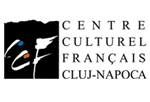Co-organizzatore: Centre Culturel Français de Cluj-Napoca
 Il Centro Culturale Francese di Cluj è stato fondato dall’Ambasciata francese in Romania nel 1991. Esso fa parte di un eccezionale rete composta da 209 Centri Francesi e Istituti Culturali sparsi in 130 paesi. Profondamente radicato nel panorama culturale di Cluj, il Centro porta avanti una grande quantità di attività nel campo della cultura e dell’educazione. Alcuni dei suoi principali obiettivi sono quelli di promuovere l’innovazione nel campo culturale e disseminare prodotti artistici, fare da ponte tra l’ambiente culturale locale e la creazione artistica francese ed europea. La partecipazione del Centro al progetto europeo “Playing Identities” è in continuità con le sue attività di supporto al lavoro e alla creazione teatrale, e rientra all’interno del suo impegno per la diffusione di una cultura aperta basta sulla diversità e l’incontro culturale.
Il Centro Culturale Francese di Cluj è stato fondato dall’Ambasciata francese in Romania nel 1991. Esso fa parte di un eccezionale rete composta da 209 Centri Francesi e Istituti Culturali sparsi in 130 paesi. Profondamente radicato nel panorama culturale di Cluj, il Centro porta avanti una grande quantità di attività nel campo della cultura e dell’educazione. Alcuni dei suoi principali obiettivi sono quelli di promuovere l’innovazione nel campo culturale e disseminare prodotti artistici, fare da ponte tra l’ambiente culturale locale e la creazione artistica francese ed europea. La partecipazione del Centro al progetto europeo “Playing Identities” è in continuità con le sue attività di supporto al lavoro e alla creazione teatrale, e rientra all’interno del suo impegno per la diffusione di una cultura aperta basta sulla diversità e l’incontro culturale.Partner Associato: Aso. Cult. Teatrul Imposibil
 The Impossible Theatre is an non-governmental and non-profit organisation founded in 2003 in Cluj-Napoca in Romania. It is interested in East-West collaboration in European and world wide experimental theatre and its social impact. The main focus is for Romanian artists and public to relate to contemporary breakthroughs in performance arts (implementation of new media and technology, aesthetic tendencies, new artistic languages) by direct contact. These activities can fill in the lack of information and contacts, and the need for a stable meeting point for this artistic and social target group, as it can influence Romanian strategies to break its cultural isolation in independent artistic field. This intercultural competence and cross-border collaboration activities are also important for our foreign participants, as they have the opportunity to enlarge their competence and their appetite for intercultural artistic and social activities.
The Impossible Theatre is an non-governmental and non-profit organisation founded in 2003 in Cluj-Napoca in Romania. It is interested in East-West collaboration in European and world wide experimental theatre and its social impact. The main focus is for Romanian artists and public to relate to contemporary breakthroughs in performance arts (implementation of new media and technology, aesthetic tendencies, new artistic languages) by direct contact. These activities can fill in the lack of information and contacts, and the need for a stable meeting point for this artistic and social target group, as it can influence Romanian strategies to break its cultural isolation in independent artistic field. This intercultural competence and cross-border collaboration activities are also important for our foreign participants, as they have the opportunity to enlarge their competence and their appetite for intercultural artistic and social activities.
One of most relevant project is the MAN.In.FEST, an event addressing young people (15-35), artists and public, both from Romania and abroad, interested in new/experimental arts and media, as they are the ones whose new perception needs and social references are served by the experimental artistic field.
The organization also has experience in publishing and editorial project: man.in.fest, a monthly magazine about new tendencies in visual arts; The Impossible Theatre Library about theatre books (theory and playwright).
The general purpose of The Impossible Theatre is to promote new theatrical forms of expression and educate the public in the direction of experimental performances as a new means of expression more suited for the 21st century audience. Theatre is a living art form and that is why its existence is strictly connected to the society in which is created. For this we need to first bring the community closer to the theatre, for the theatre to be able to represent their image.
For this reason, within the project, we will be involved in:
- Organisation and management of Creole and Emigranci performance in Romania;
- Logistic support to the academic research team;
- Creation of a network of theatrical festivals in Romania.
Partner Associato: Teatrul Naţonal Lucian Blaga
 Il Teatro Nazionale Lucian Blaga di Cluj-Napoca è una delle istituzioni teatrali più prestigiose della Romania. Costruito tra il 1904 e il 1906 dai famosi architetti austriaci Ferdinand Fellner e Hermann Helmer è in stile neo-barocco con alcune inflessioni ispirate al secessionismo evidenti nella decorazione del foyer. Originariamente concepito per ospitare 928 spettatori, la sua sala è stata ampliata tra il 1950 ed il 1956 fino a raggiungere la capacità di 1200 posti.
Il Teatro Nazionale Lucian Blaga di Cluj-Napoca è una delle istituzioni teatrali più prestigiose della Romania. Costruito tra il 1904 e il 1906 dai famosi architetti austriaci Ferdinand Fellner e Hermann Helmer è in stile neo-barocco con alcune inflessioni ispirate al secessionismo evidenti nella decorazione del foyer. Originariamente concepito per ospitare 928 spettatori, la sua sala è stata ampliata tra il 1950 ed il 1956 fino a raggiungere la capacità di 1200 posti.Dal 2000 il Direttore del Teatro Nazionale di Cluj-Napoca è Ion Vartic. Gli spettacoli che vi si rappresentano comprendono lavori drammaturginci originali, classici e moderni, rumeni o universali. Tra i molti importanti registi che vi hanno portato i propri lavori si possono citare Vlad Mugur, Mihai Măniuţiu, Sanda Manu and Alexandru Dabija.





